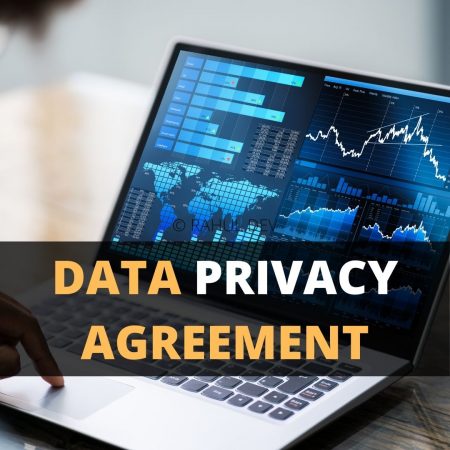Data Privacy
Explore the Process to Develop a Strong Data Privacy Agreement

Understand Practical Aspects
Understand how to ensure regulatory compliance

Explore the Process to Develop a Strong Data Privacy Agreement

Understand how to ensure regulatory compliance

Protect your innovations across multiple countries and create strong patent portfolio to boost business valuation
Local and global brand protection through international trademark registrations
Extensive research and business writing for technical whitepapers and B2B content products
Data privacy agreements are a necessary legal requirement considering the rapidly expanding digital business environment. These agreements form the legal foundation for a business by ensuring that personal and sensitive data are handled securely and in compliance with applicable laws. Companies often engage with data privacy experts to develop robust data privacy agreements that cater to specific business needs, ensuring compliance with global regulations including GDPR and CCPA. As a seasoned expert in technology law and data protection with over 18 years of international experience, I routinely execute data privacy compliance projects, including writing effective data privacy agreements that act as strategic tools for enhancing business resilience and customer confidence. Incorporating comprehensive privacy terms and clearly defined handling policies, as outlined in scholarly resources like the Harvard Business Review and industry guidelines by ISO/IEC 27001, is essential. These agreements not only ensure compliance with global standards such as GDPR and CCPA but also serve as a cornerstone for securing digital transactions and fostering an environment of trust to create an invaluable asset in today’s competitive market. This practice is further substantiated by a recent PwC survey, which found that 87% of consumers are more likely to do business with companies that offer transparent data use practices. Drawing on my extensive expertise in Blockchain, AI, and data security, I have seen that a well-crafted data privacy agreement plays a crucial role in ensuring regulatory compliance and mitigating risks. An integration of dynamic data protection frameworks can be adapted to enhance cybersecurity measures across different technology sectors.
This article covers following topics:
Data Privacy Regulatory Requirements
Data Privacy Compliance Consulting
What is a Data Privacy Agreement?
Benefits of Implementing Data Privacy Agreements
Data Privacy Policy Development

The General Data Protection Regulation (GDPR) in Europe and the California Consumer Privacy Act (CCPA) in the U.S. have established strict regulations for the management and protection of data. These requirements require firms to adopt thorough data protection procedures in order to prevent significant penalties. Statistics indicate that a significant majority of consumers worldwide, specifically 68%, express worry regarding their internet privacy. However, a considerably smaller proportion, only 29%, believe that comprehending how organizations safeguard their personal data is a straightforward task. In addition, failure to comply with data privacy regulations can result in penalties of up to €20 million or 4% of the company’s annual worldwide revenue, highlighting the financial consequences of insufficient data privacy safeguards. A study conducted by the International Association of Privacy Professionals (IAPP) has found that firms who have strong data governance plans encounter fewer breaches and incur lower compliance expenses. This highlights the practical advantages of implementing comprehensive data privacy agreements. Through my previous involvement in data privacy due diligence projects, I have come to understand that the convergence of technology law and data protection offers significant advantages for firms seeking to strengthen their data privacy protocols. A strategic strategy not only ensures adherence to legal requirements but also improves the trust and dependability felt by customers, thereby strengthening the organization’s market position.
Companies regularly opt for data privacy consulting services to avail a comprehensive suite of solutions for navigating the complex landscape of data privacy. One such service includes, Policy Development and Implementation, which covers drafting of custom privacy policies to align with global standards specific to the business model of the company. Another service covers Data Compliance Audits and Gap Analysis, which identifies and mitigates compliance risks before they result in penalties. Some companies need Data Protection Officer (DPO) as a Service, wherein these companies outsource expert DPO services to ensure ongoing compliance and training. Lastly, Incident Response Planning is another service that covers developing and implementing processes to respond effectively to data breaches.
A Data Privacy Agreement is a formal contract between an organization and its stakeholders, specifying the management and protection of personal data. This essential legal document defines the responsibilities and protocols for handling, processing, and securing personal information in compliance with applicable privacy laws, such as GDPR and CCPA. Generally, a data privacy agreement includes several key provisions and clauses, specifically defining Data Protection Policies to specify the rules for data storage, transfer, and access. This agreement further defines User Consent covering clearly defined methods for obtaining and documenting user permissions. Another key provision covers describing the Data Breach Response Plans listing step-by-step actions to be taken in the event of a data breach, including notification procedures. It is also considered a best practice to disclose various Privacy Terms stating detailed descriptions of the terms used in the agreement to ensure clarity and compliance.
Drawing from my previous experience in intellectual property and technology law, and considering the complexity of global data protection regulations, it is imperative to state the importance of a properly drafted data privacy agreements. For instance, a study in the Harvard Business Review highlights that companies with comprehensive data governance frameworks significantly reduce their susceptibility to data breaches and legal disputes. Therefore, while drafting such agreements, a keen understanding of not only legal requirements but also technical and operational nuances is crucial, as these elements collectively fortify the organization’s defenses against potential data misuse and legal challenges.
As may be seen, executing and implementing the required data privacy agreements provide significant advantages, including, securing against data breaches and unauthorized access, by employing state-of-the-art security measures tailored to the sensitivity of the data handled.
A data privacy agreement defines specific parameters for the utilization and management of data, ensuring compliance with both domestic and international regulations, such as GDPR. This helps prevent severe penalties and legal consequences. Furthermore, an explicit data privacy policy fosters trust among customers and partners by showcasing a dedication to safeguarding their personal information. This, in turn, boosts the company’s reputation and competitive standing in the market. Furthermore, a clearly stated data privacy agreement simplifies data management procedures, enhancing employees’ comprehension of their duties and obligations, so minimizing mistakes and improving operational efficiency.
This is further validated by European Data Protection Supervisor’s 2021 report that highlights that companies adhering to structured data protection frameworks like GDPR not only mitigate the risk of penalties but also gain competitive advantage through enhanced consumer trust and loyalty. Our comprehensive understanding of technology law and IP rights significantly enhances the strategic implementation of such frameworks, ensuring that our clients not only meet but exceed the regulatory standards for data privacy and security, thus safeguarding their business operations and enhancing market credibility.
While working on comprehensive data privacy policies customized to the specific needs of your business, we ensure that all aspects of data handling meet regulatory requirements and best practices. For example, in terms of regulatory alignment, the GDPR Compliance requires that various EU organizations must comply with the General Data Protection Regulation (GDPR). According to the European Data Protection Board, a large worldwide hotel chain was fined over €100 million for inadequate data security. This emphasizes the need for strict security. Similarly, the California Consumer Privacy Act (CCPA) governs how California businesses handle personal data. As large internet corporations have shown in reaction to CCPA legislation, a successful data privacy policy should allow users to opt out of data selling. Therefore, the best practices include collecting only the data needed for the purpose. This solution meets GDPR requirements and decreases data breach risks. According to “Computer Law & Security Review,” data reduction reduces legal concerns and storage expenses.
Rahul Dev, with his deep expertise in IP and data protection law, emphasizes the crucial importance of integrating compliance audits, risk assessments, and structured training into the fabric of organizational procedures. Drawing on industry research, such as the Kaspersky Lab’s report on data protection readiness, he highlights that companies implementing these comprehensive strategies significantly reduce the risk of data breaches.
In fact, organizations that regularly review and update their data protection strategies have shown a 40% lower incidence rate of security breaches compared to those that do not, as documented in IBM’s Cost of a Data Breach Report. Rahul leverages these insights to ensure that the data protection plans he develops not only meet but exceed the regulatory requirements, providing robust defense mechanisms and fostering a culture of data privacy awareness that translates into higher trust and compliance across all operational levels. This approach not only safeguards sensitive information but also solidifies the organization’s reputation as a trustworthy entity, crucial in today’s data-driven landscape.

As a business coach and thought leader, I cannot emphasize enough the importance of innovation, new software patents, mobile apps, and patents for tech companies, startups, and entrepreneurs. The world is rapidly evolving, and staying ahead of the curve is vital for success. Embracing technological advancements such as blockchain and AI can unlock unprecedented opportunities, streamline operations, and propel businesses into the future with competitive valuation via intangible assets.
Click Here for AI Startup Valuation Guide.
For instance, blockchain technology can revolutionize supply chain management and secure data sharing wherein innovative business models are explained to the audience via technical whitepapers, while AI can automate and optimize decision-making processes. Mobile apps are no longer just a luxury; they have become essential tools for engaging customers and offering personalized experiences. Furthermore, securing digital innovation patents is crucial for protecting intellectual property, fostering innovation, and maintaining a competitive edge. By investing in these areas, businesses can position themselves as industry pioneers and pave the way for a prosperous future after thoroughly conducting the due diligence and reviewing the legal opinion letters, which in case of digital assets can assist in determining the tokens as utility assets or coins as utility tokens before listing the assets at an exchange.
Our team of advanced patent attorneys assists clients with patent searches, drafting patent applications, and patent (intellectual property) agreements, including licensing and non-disclosure agreements. Advocate Rahul Dev is a Patent Attorney & International Business Lawyer practicing Technology, Intellectual Property & Corporate Laws. He is reachable at rd (at) patentbusinesslawyer (dot) com & @rdpatentlawyer on Twitter.
Quoted in and contributed to 50+ national & international publications (Bloomberg, FirstPost, SwissInfo, Outlook Money, Yahoo News, Times of India, Economic Times, Business Standard, Quartz, Global Legal Post, International Bar Association, LawAsia, BioSpectrum Asia, Digital News Asia, e27, Leaders Speak, Entrepreneur India, VCCircle, AutoTech).
Regularly invited to speak at international & national platforms (conferences, TV channels, seminars, corporate trainings, government workshops) on technology, patents, business strategy, legal developments, leadership & management.
Working closely with patent attorneys along with international law firms with significant experience with lawyers in Asia Pacific providing services to clients in US and Europe. Flagship services include international patent and trademark filings, patent services in India and global patent consulting services.
Global Blockchain Lawyers (www.GlobalBlockchainLawyers.com) is a digital platform to discuss legal issues, latest technology and legal developments, and applicable laws in the dynamic field of Digital Currency, Blockchain, Bitcoin, Cryptocurrency and raising capital through the sale of tokens or coins (ICO or Initial Coin Offerings).
Blockchain ecosystem in India is evolving at a rapid pace and a proactive legal approach is required by blockchain lawyers in India to understand the complex nature of applicable laws and regulations.